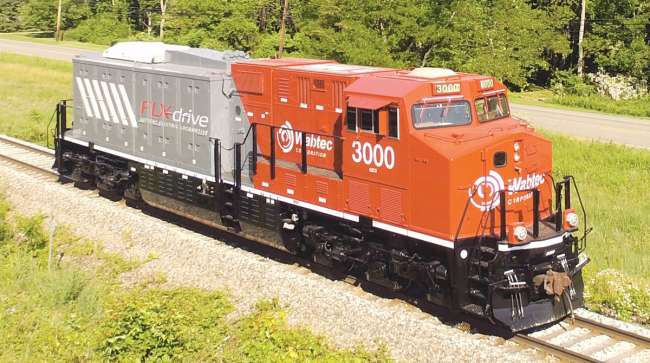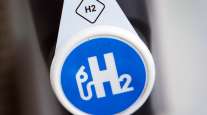Staff Reporter
FRA Awards $96.5M to Hydrogen Rail Projects in Three States

[Stay on top of transportation news: Get TTNews in your inbox.]
The Federal Railroad Administration has directed $96.5 million toward three hydrogen rail projects in California, Colorado and Pennsylvania from a $2.4 billion grant package awarded to 41 states for infrastructure and safety improvements.
Federal funds for 122 railway projects were recently awarded through the FRA’s Consolidated Rail Infrastructure and Safety Improvements Program for fiscal years 2023 and 2024. Of the $2.4 billion allocation, FRA officials designated $150 million for capital projects for new intercity passenger rail routes, $32 million to deter trespassing, $7 million for magnetic levitation initiatives and $5 million for workforce development.
FRA Administrator Amit Bose predicted all the funded projects “will enhance rail safety, better connect towns, cities and ports, introduce more environmentally friendly locomotives, support the current rail workforce, and provide workforce development opportunities essential to the future of our industry and the national economy.”
Under terms of the grant program, FRA will pay no more than 80% of a project’s cost, with a minimum 20% match that can include in-kind contributions.
According to the FRA, its Consolidated Rail Infrastructure and Safety Improvements Program is the only federal grant program focusing on shortline railroads, which form a critical part of the U.S. supply chain. There are 603 shortline railways carrying nearly 30% of the nation’s rail freight, per the American Short Line and Regional Railroad Association.
Want more news? Listen to today's daily briefing above or go here for more info
The states to receive the largest FRA grants were California ($259.4 million), New York ($246.8 million) and Illinois ($199.9 million).
California Air Resources Board will receive $36.5 million for three zero-emission initiatives to replace 10 diesel locomotives — one with hydrogen fuel cells and nine with electric batteries.
Pacific Harbor Line Inc., which serves the ports of Los Angeles and Long Beach, will acquire five battery-electric locomotives and two battery chargers. The company will contribute $6.37 million, while the FRA grant will provide $34.2 million.
Company president Otis Cliatt II said the federal grant will provide “crucial support” to help transform rail operations and “will support our continuing commitment to reducing emissions at the ports of Los Angeles and Long Beach, the busiest port complex in the U.S.”
The other battery-electric locomotives — four locomotives plus a pair of battery chargers — will be allocated to Watco, an owner and operator of shortline railroads.
The Sacramento Valley Railroad, a Class III shortline railroad operating seven miles of track in McClellan, Calif., will receive the single hydrogen fuel cell locomotive. Its parent is Patriot Railway Co. of Jacksonville, Fla., which has 32 shortline freight railroads traveling over 1,260 track miles across 23 states.
Host Seth Clevenger and Features Coordinator Mike Senatore take you behind the scenes to unveil the 2024 Top 50 Global Freight Companies. Tune in above or by going to RoadSigns.ttnews.com.
The Sacramento Valley Railroad mostly handles such commodities as aggregates, agricultural products, biofuels, crude oil, machinery and equipment, metal and steel products, scrap paper, containerboard, plastic resin and steel pipes.
Another FRA grant (up to $48.4 million) has been earmarked for Pennsylvania for the East Erie Commercial Rail to determine how to deploy hydrogen technologies. This research and development project will explore hydrogen dual-fuel internal combustion engine and liquid hydrogen tender technologies. Wabtec Corp., Linde and The Greenbrier Cos. will provide the required 20% funding match.
Linde ranks No. 79 on the Transport Topics Top 100 list of the largest private carriers in North America.
“This demonstration will be conducted at the FRA’s Transportation Technology Center in Pueblo, Colo., to support educating rail operators, first responders, and other stakeholders about how to safely handle hydrogen, in addition to developing best practices for operationalizing and maintaining these technologies for rail,” FRA noted.
Colorado State University will receive the final hydrogen grant of $11.6 million to examine green hydrogen and renewable natural gas-powered rail vehicles. The study will involve operational safety tests of railway cars powered by compressed hydrogen and compressed natural gas at the Transportation Technology Center.
The University of Hawaii and OptiFuel, a small company focused on zero-emission switcher and linehaul locomotive systems, will contribute 36% of the total project cost.





